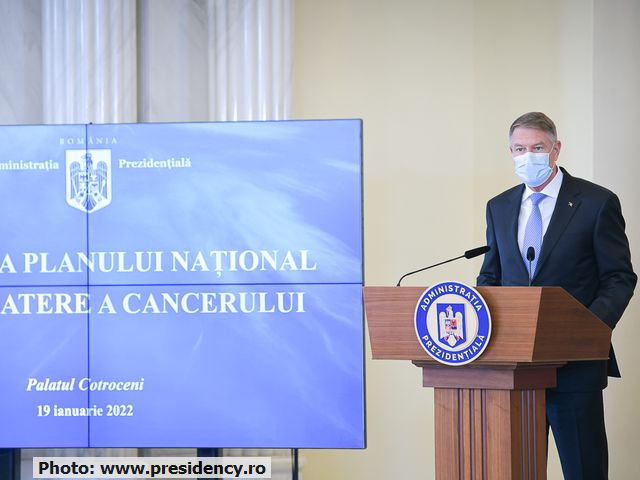Romania and the fight against cancer
Authorities have launched a national anti-cancer program

Corina Cristea, 04.02.2022, 14:00
In February 2021, the European Commission
launched Europe’s Beating Cancer Plan, whereby it allotted €4 billion to fund
cancer prevention, research and treatment programs across the EU. Shortly
afterwards, Romanian authorities starting transposing this plan into national
law. Last month saw the launch of Romania’s National Anti-Cancer Plan, which
first and foremost lays out the standard protocol cancer patients must observe,
from the first signs of the disease until the completion of therapy. Moreover,
the plan is based on a multidisciplinary approach: cancer patients can seek
treatment from a team of specialists. This extended approach, involving
prevention, screening, diagnosis, treatment and palliative care, also involving
recovery and reintegration, entails a strategy that only a multidisciplinary
team can elaborate and provide to the patient. Finally, the plan brings to the
fore innovation, research and patient-oriented medicine, as Diana Păun, a
presidential healthcare advisor, has told Radio Romania.
The plan was patterned on the European
plan itself, there are clear deadlines for every objective. There are 11
objectives in total, with specific goals for specific types of cancer that we
have factored in, namely those forms that are most frequent in Romania:
colorectal cancer, breast cancer and cervical cancer for women, lung cancer and
prostate cancer for men, but also leukemia and childhood cancer. There are
specific deadline-related goals spanning until 2026. Of course, we want to
implement some goals before that, for instance national screening programs for
certain types of cancer such as breast, lung or colorectal cancer are supposed
by finalize by January 1, 2023. A National Cancer Register, an important and
necessary measure, is expected to be up and running by 2024, and by 2026 we
plan on creating a healthcare innovation fund, with multiple financing sources,
that should provide Romanian patients with quick access to new therapies in due
time.
Due to system-wide underfunding, access to
new drugs is very difficult for Romanian patients compared to elsewhere in
Europe, which is why the plan also seeks to provide Romanian patients with
quick access to new drugs and state-of-the-art screening methods, Diana Păun
says.
A central element in the new plan is the
focus on medical innovation and research and on digital solutions. The pandemic
has taught us to resort to these means in order to communicate and benefit from
all the findings of research. The plan has a clear objective that must be
implemented by 2023: to come up with criteria that should allow for
reimbursements of genetic testing, which is the latest medical breakthrough in
this field, genetic cancer markers that can predict the risk that a certain
individual develops a specific type of cancer. And if we know in advance what
type of cancer to expect in certain individuals, we can prevent the disease or,
if the disease is already active, prescribe better-targeted and patient-oriented
treatments that should generate less adverse reactions and increase chances of
recovery.
Europe’s Beating Cancer Plan will divide
its billion-euro funds to each member state depending on projects established
at national level. The Plan allows for great financial opportunity, Diana Păun
argues, and hopefully researches, physicians, hospital managers and
institutions in Romania will try to access these funds, based on a strategic
concept that experts have already provided. Europe’s Beating Cancer Plan, which
was used as a model for Romania’s own plan, provides four main pillars with
separate funding. The first refers to prevention, namely raising public
awareness and accountability with respect to healthy living: avoiding smoking,
alcohol abuse, healthy eating, preventing pollution. The second pillar has to
do with screening, namely early diagnosis. Right now, Romania has a single
cancer screening program for colorectal cancer, although there are numerous
types of cancer such as breast cancer or lung cancer that require screening
programs. A third pillar refers to diagnosis using state-of-the-art methods and
innovative treatments. The last pillar refers to access to palliative care, an
aspect that has been neglected for a long time in Romania. According to
official data, some 2.7 million cases of cancer and 1.3 million related
fatalities were reported in Europe in 2020. In Romania, figures speak of
approximately 99 thousand new cases and over 54 thousand cancer-related deaths.
(VP)






























